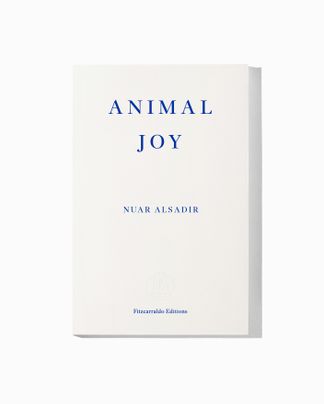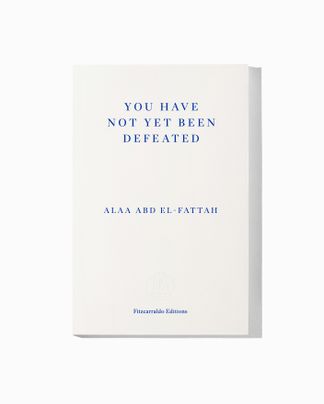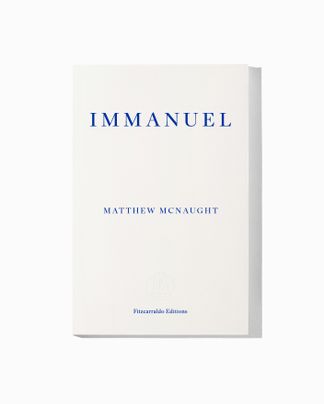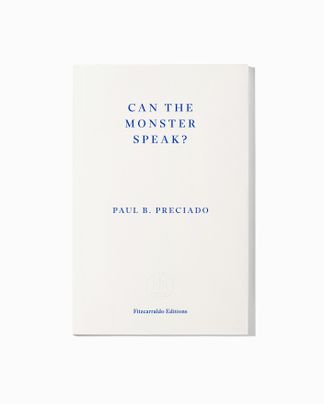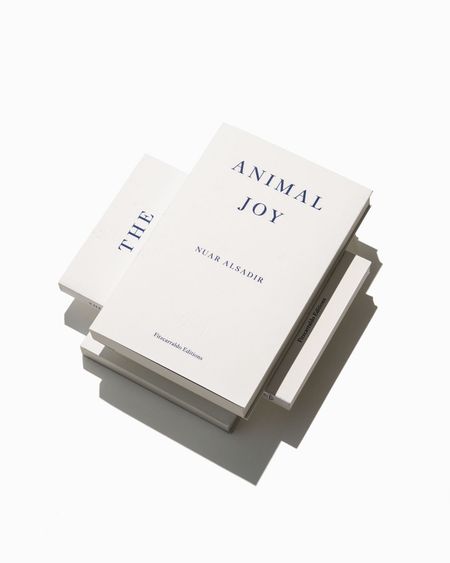What do you do with death and dying when they can no longer be pushed to the outer limits of your lived experience or dismissed from your conscious mind? How do you live with death or rather how do you ‘live death’ when death comes too close, seeming to enter the very air you breathe?
The Plague is a collection of essays guiding us from the Covid-19 pandemic through to the war in Ukraine in order to imagine a world in which a radical respect for death might exist alongside a fairer distribution of the earth’s wealth. ‘Living death’ will appear as something of a refrain, a reminder that to think of death as an avoidable intruder into how we order our lives, especially in the West, is an act of defiance that is doomed to fail. In the thought of the philosopher Simone Weil, who plays a key role in the book, only if we admit the limits of the human, will we stop vaunting the brute illusion of earthly power.
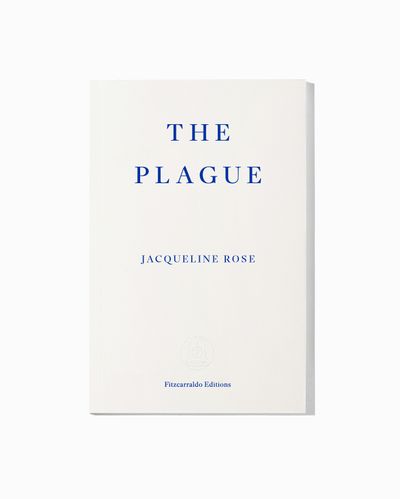
The Plague
French paperback with flaps, 160 pages
Published 7 June 2023
The Plague
INTRODUCTION: THE WAY IN
This book has been written in the heat and chill of its moment. It begins with the first UK pandemic lockdown in March 2020 and then takes us forward to barely two years later, when Vladimir Putin’s invasion of Ukraine had just begun. As I write these pages, war has broken out in the heart of Europe, shattering the illusion, partly fostered by the pandemic, that the world is united in the struggle against needless dying. Such unity was in any case a myth, honed to Western privilege and blindness, as the slew of wars across less newsworthy continents – from Yemen to Syria to Ethiopia – so clearly testifies. One of the most difficult aspects of these past years has been to square what felt at the start like a new global solidarity in response to the pandemic with the inequalities which slowly, or not so slowly, rose to the surface of public life, exposing the brute vulnerability of the subordinate, marginal, oppressed and the poor. No amount of common purpose has been able to thwart the power of wealth and status to determine who lives and who dies – whether in the guise of big pharma blocking patent waivers on Covid-19 vaccinations, or the surge in domestic violence, or the daily threat of racist killings on the streets. The pandemic struck like a force of nature, but, like the climate catastrophe, it also laid bare just how far nature is a plaything of human whim.
And then, as Russia’s violence in Ukraine ratcheted up on a daily basis, the world found itself faced with the megalomaniac tyranny of state boldly proclaiming its capacity to destroy the world. When violence takes the form of tanks on the street, we can no longer assign it to the heavens. One of the strangest and most perverse gifts of war is its capacity to shred any delusion that death is somehow random and innocent of human calculation. Instead, death belongs at the heart of the very legal authority to which we have been appealing to subdue it. In reality, death is always stalking among us, at once the starkest measure of unjust social arrangements, the prized monopoly of statecraft, and a reminder of the limits of human power.
What do you do with death and dying when they can no longer be pushed to the outer limits of your lived experience or dismissed from your conscious mind? How do you live with death or rather how do you ‘live death’ – a formula which might seem at first glance to defy understanding – when death comes too close, pervading the air you breathe? In what follows, ‘living death’ will appear as something of a refrain, a reminder that to think of death as an unavoidable intruder into how we order our lives, especially in the West, is an act of defiance that is doomed to fail. In the thought of the philosopher Simone Weil, it is only in admitting the limits of the human that we will stop vaunting the brute illusion of earthly power, as if we owned the world we live in.
Perhaps, then, if those limits were acknowledged, the world would look less murderous. Killing is one of the most effective, but also desperate and self-defeating, ways of warding off one’s own death (a fantasy demonstrated by the need of serial killers to kill over and over again). For Putin, being president for life is not enough. He is aiming for the stars. The goal to finish off Russia is ‘centuries old and unchanging’, according to pro-Kremlin news host, Dmitry Kiselyov. In the words of Ukrainian writer, Oleksandr Mykhed, Russia is a country that ‘lives by the holy conviction that it will exist for ever’. It is in the name of ‘eternal Russia’ that missiles rain down on Ukraine (even if the Western powers had up to this war preferred to treat Putin as a rational technocrat with whom they could do business). Dictators always believe – or rather act as if they believe – that they are invincible, although somewhere they know this to be a lie. Which is why they respond to every sign of possible failure – a forty-mile convoy of Russian tanks, which Ukraine could never match, grinding to a halt in the early spring mud at the outset of the war – by lashing out even more. Like warriors, what invading armies want, Weil writes in perhaps her most famous essay ‘The Iliad or the Poem of Force’ is ‘everything’. ‘They forget one detail, that everything is not within their power.’ For the Russian people, any victory will be hollow. They will be left with the death bowl of their dreams.
We need a different mental dispensation, one that does not flatten the world to its own worst contours but rather bends and moves against the grain, following the most sinuous, risky and creative pathways of the mind. Can we imagine a world in which the deepest respect for death would exist alongside a fairer distribution of the wealth of the earth so that each individual has their share? How can we ensure that death, as much as life, is given its dignity? How to honour the nameless Covid-stricken corpses burning in the night on the streets of Indian cities, or the woman in Kyiv spooning the shards of glass from her shattered balcony window while her building, its foundations blasted to pieces, teeters on the verge of collapse? These images are just two of the many that have haunted me over these past years, raising questions to which I return repeatedly in what follows. What can we ask of the polity in apocalyptic, plague-ridden times, when the worst of such times has manifestly arisen out of the decisions of the polity itself? What can we ask, or rather what should we be asking, of ourselves?
(…)
‘The vitality of these valuable essays on death, war and Simone Weil keeps on giving long after the last page has been turned.’
— Deborah Levy, Guardian
‘Rose cements her place at the summit of Anglo literary culture. The book is also testament to the essay as the most exhilarating form through which to confront the history of the present.… Rose never tries to have the last word or entomb her subjects in cast-iron conclusions about their life and thought. She invites us to do our own thinking, to grapple with the violence and paradoxes of existence.’
— Gavin Jacobson, New Statesman
‘This is a brief but beautifully written book, full of memorable insights into life, death, and politics. In particular, the final essay on Weil is a wonderfully moving mix of biographical, philosophical and political analysis…. In Weil’s writings, Rose finds a glimmer of hope in dark times: “against race, class and national affiliations, Weil’s heart is beating right across the globe”.’
— PD Smith, Guardian
‘It’s really hard for me to overestimate how important [Rose’s] work has been for me…. I don’t feel like that about very many writers.’
— Maggie Nelson
‘Jacqueline Rose has no peer among critics of her generation. The brilliance of her literary insight, the lucidity of her prose, and the subtlety of her analyses are simply breathtaking.’
— Edward Said
‘A surfeit of elegance and intelligence.’
— Ali Smith
‘One of the most original and intellectually sophisticated minds at work today.’
— Eimear McBride
‘As a literary scholar and psychoanalytic thinker, Rose has long insisted that we pay close attention to the subterranean fears, fantasies, and narratives that structure our most pressing sociopolitical problems.’
— Merve Emre, The Nation
‘To read Rose is to understand that there is no border between us and the world; it is an invitation to a radical kind of responsibility.’
— Parul Sehgal, New York Times
‘[Rose’s] work remains surprising and original…. The more I read her, the more I see the world through her questions…. Her real power, what makes her necessary as well as unique, may be how she teaches readers to ask probing questions on their own.’
— Christine Smallwood, New York Review of Books
‘Instead of avoiding that foregone conclusion, these essays – which touch on everything from the pandemic to the war in Ukraine – encourage a radical respect of death as, if nothing else, a reminder of our equality as humans, which feels especially important in a world that grows less equal by the day.’
— Róisin Lanigan, i-D
‘Rose’s excellence as a critic rests on how well she nurtures others’ ideas, how plausibly she treats them as her own. Every written sentence tries to embody an idea, to give it a shape that limns its meaning, as if to recollect something of cave-time signification.’
— Sarah Nicole Pricket, Bookforum
‘This book is … startingly up-to-date in ways that other explorations of the pandemic are perhaps not, set as it is on reminding the reader that, while we may be some way out of the woods, there remains a discomforting after-effect. So, despite dealing explicitly with the pandemic, Rose establishes a formulation within a period bookended by two key events: the beginning of UK lockdown and the invasion of Ukraine, yoking them together in accordance with Albert Camus’ assertion that “the two realities of history which to date people have never been prepared for [are] plagues and wars,” and an understanding that, often, one disaster bleeds into the next. This stands in quiet structural defiance to the usual narrative rolled out by news outlets, in which each constituent tragedy stands isolated and disconnected from the other.’
— Lia Rockey, Arts Desk
‘[A] slender, brilliant collection of essays that takes the catastrophe of the pandemic as its principal subject, though war, protest and climate injustice feature prominently. Her overarching assertion is that in this moment of illness and upheaval, we can no longer push death to the periphery. Rather, we would be wise to treat it as a type of companion – as a fate that binds us all but which is doled out unjustly…. If she seems to be grappling with grim subjects, Rose’s writing is always playful and unexpected.’
— Isabella Trimboli, Saturday Paper
Jacqueline Rose is internationally recognized as one of the most important living feminist and cultural critics. She is the co-director of the Birkbeck Institute for the Humanities, a co-founder of Independent Jewish Voices, and a fellow of the British Academy and of the Royal Literary Society. Rose is a frequent contributor to the London Review of Books and the Guardian, among many other publications. Her books include Sexuality in the Field of Vision, The Haunting of Sylvia Plath, States of Fantasy, Women in Dark Times, Mothers: An Essay on Love and Cruelty, On Violence and On Violence Against Women and, also published by Fitzcarraldo Editions, The Plague: Living Death in Our Times.

